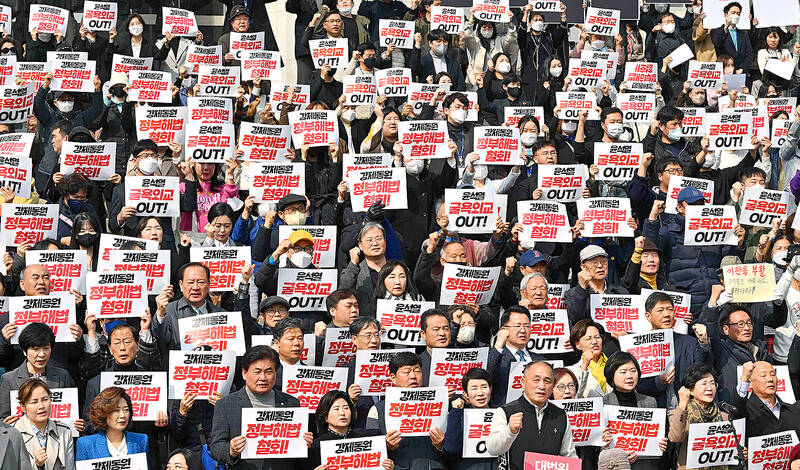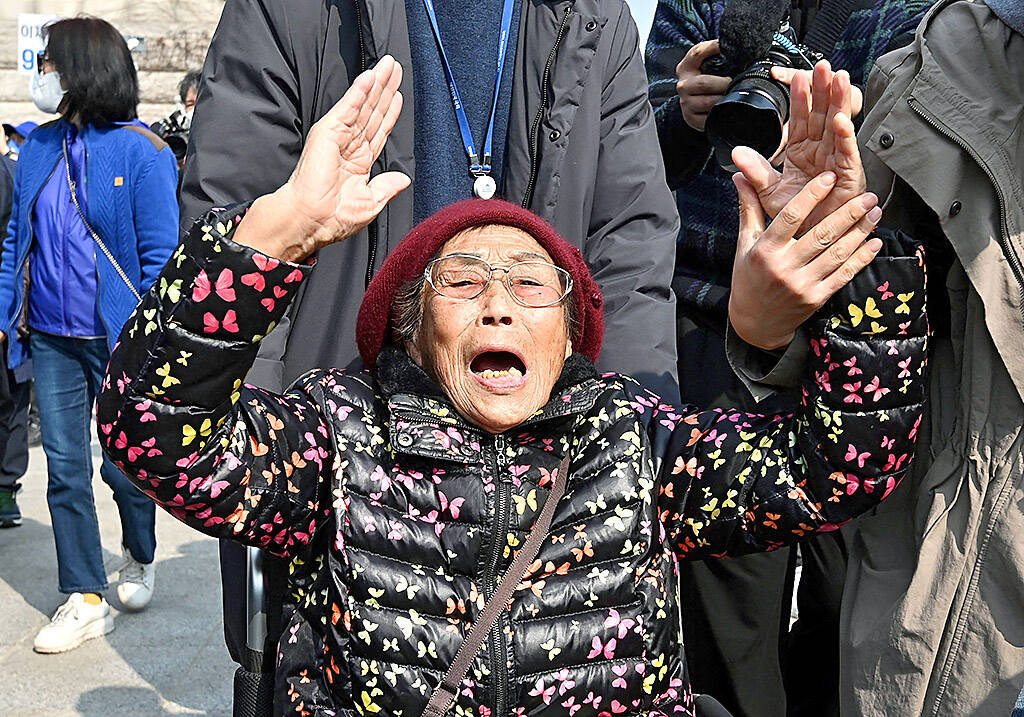South Korea moved towards resolving a delicate, historical dispute with Japan over World War II-era forced labor on Monday as Seoul seeks closer ties to counter North Korea.
Why is the issue so sensitive and what will it take for the two countries — both key US security allies — to move beyond their fraught past? Here are some key dates in the story.
COLONIAL PERIOD

Photo: AFP
Japan and Korea have fought since at least the seventh century, with Tokyo repeatedly trying to invade.
Japan annexed Korea in 1910.
Koreans were forced to adopt Japanese surnames during the colonial period and, when World War II broke out, were conscripted into the Imperial Army or made to work in mines and factories.

Photo: AFP
Japan also forced tens of thousands of women from across Asia, many of them Korean, to provide sexual services to Japanese soldiers.
The occupation ended in 1945 with Japan’s wartime surrender.
KOREAN WAR
The Korean peninsula was carved up by victors the United States and the Soviet Union after the war.
Communist North Korea invaded the capitalist South in June 1950, sparking a brutal war that killed millions of people.
The conflict ended in an armistice rather than a full peace treaty, further delaying and complicating the resolution of colonial-era issues.
THE 1965 TREATY
Former South Korean president Park Chung-hee agreed in 1965 to normalize relations with Japan in exchange for economic support to launch a meaningful post-Korean War recovery.
Tokyo insisted that 1965 treaty, under which the two countries restored diplomatic ties with a reparations package of about $800 million in grants and cheap loans, settled all claims relating to the colonial period.
The deal triggered bitter public protest in South Korea.
‘COMFORT WOMEN’
Kim Hak-sun came forward in August 1991 to testify about her experience as a “comfort woman” made to provide sexual services for the Japanese military, the first Korean to speak about it publicly.
Her action encouraged hundreds of victims from Korea, China, Taiwan, the Philippines, Indonesia, and the Netherlands to do the same.
FIRST APOLOGIES
In 1995, then prime minister Tomiichi Murayama extended a “heartfelt apology” for Japan’s “colonial rule and aggression (which) caused tremendous damage and suffering.”
A similar declaration, between then leaders Keizo Obuchi and Kim Dae-jung, followed in 1998.
Junichiro Koizumi, another Japanese prime minister, personally wrote to surviving “comfort women” in 2001.
Many Koreans have criticized the apologies, wanting Japan to admit legal responsibility and pay compensation.
2015 DEAL
South Korea and Japan reached a “final and irreversible” agreement in December 2015, under which Tokyo offered an apology and one billion yen to open a foundation to support surviving comfort women.
Many of them received funds from the foundation but other victims and activists condemned the deal, citing Japan’s refusal to accept formal legal responsibility.
Japan said the payment was aimed at “restoring the women’s dignity” but was not official compensation.
BACKTRACKING
South Korea’s left-leaning government threatened to scrap the comfort women deal in 2018, then-president Moon Jae-in describing it as “seriously flawed.”
The Moon administration shut down the fund in 2019, saying it wanted to “recover the SUPREME COURT RULING
South Korean courts ruled in 2018 that Japanese companies should pay restitution to Korean forced laborers during World War II, a landmark ruling that further torpedoed ties.
Japan imposed controls on the export of crucial semiconductor materials the following year and removed South Korea from its “preferred trading nations” list — seen by experts as likely retaliation.
NEW ADMINISTRATION
South Korean President Yoon Suk-yeol vowed to get tough on North Korea and improve ties with Tokyo on taking office in 2022. Pyongyang conducted a record number of banned weapons tests, prompting Yoon to boost joint military drills with security partners Washington and Tokyo and to move to resolve lingering wartime disputes.
NEW DEAL
South Korea announced on Monday plans to compensate victims of Japan’s forced wartime labor by taking money from major South Korean companies that benefited from the 1965 treaty.
Seoul expressed hopes for a positive response from Japan that included “Japanese companies’ voluntary contributions and a comprehensive apology.”
The announcement was denounced by victims, who want a full apology and compensation from the Japanese companies involved.
While the plan did not include a fresh apology, Japanese Foreign Minister Yoshimasa Hayashi said Tokyo stood by its 1998 declaration and apology.

On April 26, The Lancet published a letter from two doctors at Taichung-based China Medical University Hospital (CMUH) warning that “Taiwan’s Health Care System is on the Brink of Collapse.” The authors said that “Years of policy inaction and mismanagement of resources have led to the National Health Insurance system operating under unsustainable conditions.” The pushback was immediate. Errors in the paper were quickly identified and publicized, to discredit the authors (the hospital apologized). CNA reported that CMUH said the letter described Taiwan in 2021 as having 62 nurses per 10,000 people, when the correct number was 78 nurses per 10,000

As we live longer, our risk of cognitive impairment is increasing. How can we delay the onset of symptoms? Do we have to give up every indulgence or can small changes make a difference? We asked neurologists for tips on how to keep our brains healthy for life. TAKE CARE OF YOUR HEALTH “All of the sensible things that apply to bodily health apply to brain health,” says Suzanne O’Sullivan, a consultant in neurology at the National Hospital for Neurology and Neurosurgery in London, and the author of The Age of Diagnosis. “When you’re 20, you can get away with absolute

When the South Vietnamese capital of Saigon fell to the North Vietnamese forces 50 years ago this week, it prompted a mass exodus of some 2 million people — hundreds of thousands fleeing perilously on small boats across open water to escape the communist regime. Many ultimately settled in Southern California’s Orange County in an area now known as “Little Saigon,” not far from Marine Corps Base Camp Pendleton, where the first refugees were airlifted upon reaching the US. The diaspora now also has significant populations in Virginia, Texas and Washington state, as well as in countries including France and Australia.

May 5 to May 11 What started out as friction between Taiwanese students at Taichung First High School and a Japanese head cook escalated dramatically over the first two weeks of May 1927. It began on April 30 when the cook’s wife knew that lotus starch used in that night’s dinner had rat feces in it, but failed to inform staff until the meal was already prepared. The students believed that her silence was intentional, and filed a complaint. The school’s Japanese administrators sided with the cook’s family, dismissing the students as troublemakers and clamping down on their freedoms — with